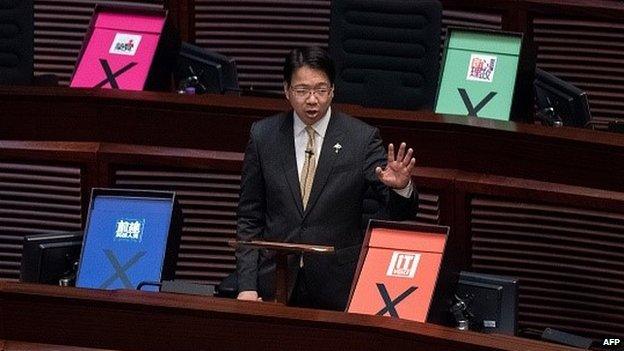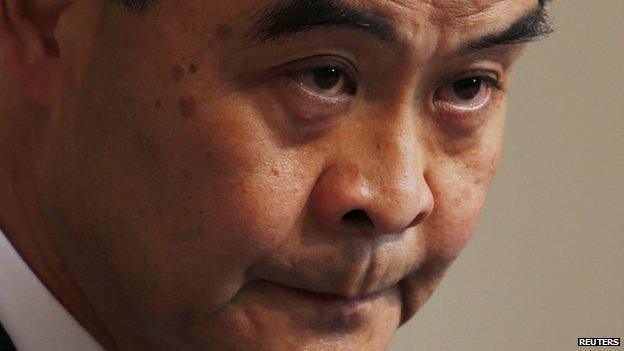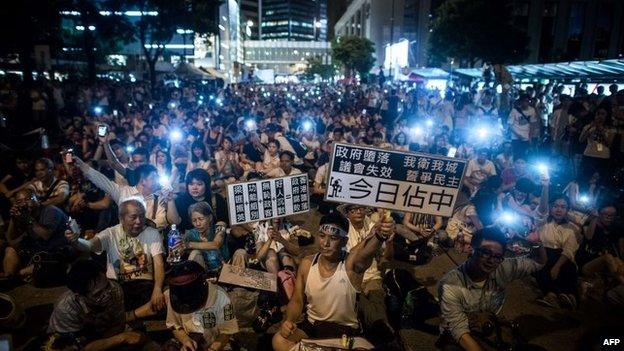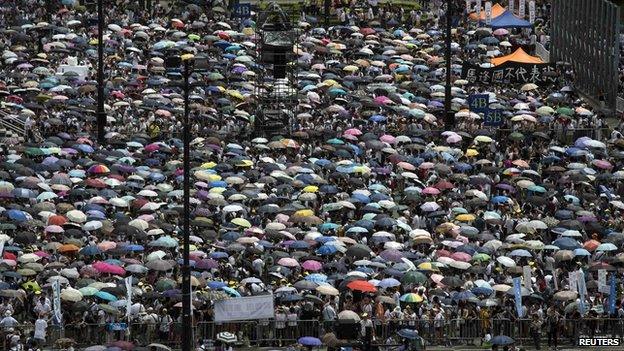What next in Hong Kong-Beijing democracy tussle?
- Published

Pro-democracy lawmaker Charles Mok addresses Hong Kong's legislature
Lawmakers in Hong Kong have rejected a highly controversial proposal by the government to change the way the territory chooses its top leader.
The vote failed after only eight members of the Legislative Council voted for the motion, with 28 against it. Most of the other lawmakers in the 70-member council staged a dramatic walkout.
It capped nearly two years of debate, public consultations and months of street protests. So, what's next for political reform in Hong Kong?

Another round of voting before 2017?
It is the responsibility of the chief executive, currently CY Leung, to initiate the process that would change how his position is selected.

Hong Kong's next chief executive is likely to be selected in the same way as CY Leung
But after a landslide vote against the government's proposal this week, Mr Leung has said he plans to focus on improving people's livelihoods, instead of political reform, for the rest of his term as Hong Kong's top leader.
His deputies have consistently stated the process would not begin anew before 2017, when the next chief executive election is due.
That means the next chief executive will be elected in the same way that Mr Leung was chosen.
He was selected by a 1,200-member committee, composed of members largely loyal to the Chinese government.

What is the process for starting future political reforms?
There is a five-step process for amending how the chief executive and members of the Legislative Council are elected.
First, the current chief executive must make a report to the Standing Committee of China's National People's Congress (NPC) asking for change.
Then, that body would decide whether changes are necessary. It may also issue a framework for future proposals to follow.
Thirdly, the Hong Kong government must create a proposal for voting at the Legislative Council. If it passes, the chief executive will then ratify the vote.
And finally, the Standing Committee must also approve it.

Beijing says its controversial decision last year 'remains in force' despite the vote. How can that be?
Last year, during the second step of the amendment process, the Standing Committee announced a highly restrictive framework on how candidates for the position of chief executive must be shortlisted.

China is unlikely to change its position despite pressure from protesters
It was this decision that prompted a city-wide boycott of classes by university students, leading directly to the Umbrella movement, during which tens of thousands of people took to the streets.
So, the latest announcement is a sign that the Chinese government will not change its position, even when future reforms are sought.
A statement from the NPC said: "The decision shall continue to serve as the constitutional ground for Hong Kong in the future as it enforces universal suffrage in the chief executive election, and its legal force is unquestionable."

Will the Umbrella movement return?
The leaders of the Umbrella movement have made no plans to re-occupy streets in Hong Kong.

Hong Kong's pro-democracy appears unsure about how to move forward
There is much debate among pro-democracy activists about the best way to achieve their goals of civic nomination, allowing voters to have a say in how candidates are nominated.
According to the Basic Law, candidates must be selected by members of a 'broadly representative' nominating committee.

What happens to Hong Kong in 2047?
Hong Kong is part of China.
But there is a border between the former British colony and the Chinese mainland.
The city was promised it could keep its laws, its freedoms and its capitalist way of life until 2047, exactly 50 years after returning to China.
In 2047, in theory, the division between Hong Kong and the rest of China would disappear.